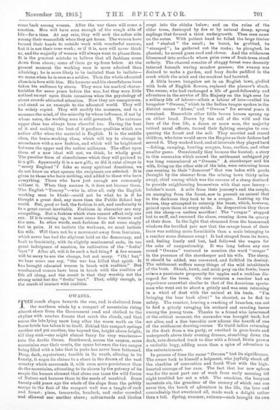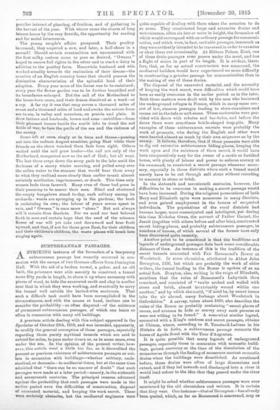• OWASSA. T HE'ranch slopes towards the sun, and is sheltered
from the northern winds by a rampart of mountains rising almost sheer front the Government road and clothed to the skyline with sombre forests that catch the clouds, and that nurse the late-lying snow long after the warm earth on the lower levels has taken it to itself. Behind this rampart springs another and yet another, tier beyond tier, height above height, till they sink-=one might almost fancy for very weariness— into the Arctic Ocean. Southward, across the canyon, more mountains rear their crests, the space between the two ranges being filled with a lake that in parts has never been fathomed. Deep, dark, mysterious; terrible in its wrath, alluring in its beauty, it urges its claims to a share in the drama of the vast country which surrounds it, with even more persistence than do the mountains, attracting to its shores by the potency of its magic the human element that alone can tame the wild forces of Nature and harness them to the needs of mankind. Some twenty-odd years ago the whole of the slope from the pebbly merge to the font of the rampart wall was a tangle of rock and forest r pines, tamaracks, hemlock, and cedar crowded ' and elbowed one another above; cottonwoods and birches crept into the chinks below; and on the ruins of the older trees, destroyed by fire or by natural decay, sprang saplings that formed a thick undergrowth. Then man came on the scene. With patient hand he felled the large timber and " slashed " the small ; he burnt, be grubbed, he e dumped"; he gathered out the rooks; he ploughed, he planted; he sowed grass seed and clover. And the wilderness blossomed into orchards where prim rows of fruit-trees stood orderly. The charred remains of shaggy forest were decently interred beneath waving meadow grasses; the swamp was drained to make a garden, and busy ducks paddled in the creek which the mink and the muskrat had haunted.
A little brown bungalow set in an English lawn, girdled with beds of English flowers, replaced the pioneer's shack. The owner, who had exchanged a life of good-fellowship and adventure in the service of His Majesty on the high seas for a solitary life of labour—albeit a labour of love—called his bungalow " °wearer," whioh in the Indian tongue spoken in the district means Alone," and " Owassa" for several years it remained. Meanwhile other little brown houses sprang up on either hand. Drawn by the call of the wild and the lure of the free life, a dozen or more men, the majority retired naval officers, turned their fighting energies to con- quering the forest and the soil. They married and reared children, who later would serve the Empire as their fathers had served it. They worked hard, and at intervals they played hard —fishing, camping, hunting cougars, bear, cariboo, and other smaller game. Occasionally they became the hunted; a story in this connexion which caused the settlement unfeigned joy was long remembered at " Owassa." A storekeeper and his wife, living on the other side of the lake, were returning home one evening in their democrat" that was laden with goods (brought by the steamer from the mining town thirty miles away), chief among which was the carcase of a sheep destined to provide neighbouring housewives with that rare luxury— butcher's meat. A mile from their journey's end the couple, on emerging from the forest, saw in pursuit an animal that in the darkness they took to be a cougar. Lashing up the horses, they attempted to outstrip the beast, which, however, gained upon them at every stride. In desperation they threw out the sheep—a useless sacrifice! The " cougar " stopped but to sniff, and resumed the chase, running down its quarry at their door. In the light that streamed from the homestead windows the terrified pair saw that the savage beast of their fears was nothing more formidable than a mule belonging to a rancher some distance away 1 It had strayed from its home, and, feeling lonely and lost, had followed the wagon for the sake of companionship. It was long before any one round " Owassa" ventured to mention the word "cougar" in the presence of the storekeeper and his wife. The sheep, it should be added, was recovered, and fulfilled its destiny. The settlement suffers many things of the wild inhabitants of the hush. Skunk, hawk, and mink prey on the fowls; bears evince a passionate propensity for apples and a reckless dis- regard for the trees. On one occasion a rancher had an experience somewhat similar to that of the American sports- man who went out to shoot a grizzly and was seen returning in a whirl of dust with the animal at his heels. "I'm bringing the boar back alive!" he shouted, as he fled to safety. The rancher, hearing a crashing of branches, ran out to find a grizzly ravaging his orchard and creating havoc: among the young trees. Thanks to a friend who intervened at the critical moment, the marauder was brought back, but not alive, and a fine bearskin now adorns the hearth of one of the settlement drawing-rooms. To timid ladies returning in the dusk from a tea party, or swathed in gum-hoots and waterproofs above their evening dresses, stumbling down the dark, rain-drenched track to dine with a friend, Bruin proves a veritable bogy, adding more than a spice of adventure to the entertainment.
. In process of time the name " Owassa" lost its significance. The owner took to himself a helpmeet, who joyfully shook off the shackles of convention and fared West with the high- hearted courage of her race. The fact that her new sphere was for the most part one of work from early morning till night troubled her not a whit. The sunshine, the buoyant mountain air, the grandeur of the scenery of which one can never tire, the touch of adventure in the life, the love and comradeship that sweetened all, made work a delight rather than a toil. Spring, summer, autumn--each brought its own peculiar interest of planting, of fruition, and of gathering in the harvest of the year. With winter came the charm of long leisure hours by the cosy fireside, the opportunity for reading and for social intercourse.
• The young couple's affairs prospered. Their poultry increased; they acquired a cow, and later, a half-share in a second t Should certain eventualities not unconnected with the first milky matron come to pass as desired, " Owassa " hoped to secure full rights in the other and to start a dairy in addition to the poultry farm. Meanwhile husband and wife worked steadily towards the realization of their dream—the creation of an English country home that should possess the distinctive characteristics of the splendid land of their adoption. Every year more of the forest was to be reclaimed ; every year the flower garden was to be further beautified and its boundaries enlarged. But the call of the Motherland to the home-born came, and their dream dissolved at a word—at a cry. A far cry it was that rang across a thousand miles of ocean and a thousand miles of land and awoke the echoes from sea to sea, in valley and mouutain, on prairie and plain. It drew fathers and husbands, lovers and sons—unbidden—from their plea:mint homes beside the sunlit lake to tread the red fields of war, to face the perils of the sea and the violence of the enemy.
Some left at once, singly or in twos and threes—passing out into the radiant August sunshine, going East while their friends on the shore watched them fade from sight. Others waited until the call grew louder—the call not only of the Motherland, recognized now as the call of God ; but all went. The last three crept down the steep path to the lake amid the darkness of a snowy winter morning, and pulled away over the sullen water to the steamer that would bear them away to what they realized more clearly than earlier meant almost certainly mutilation, imprisonment, or death. This time only women bade them farewell. Many even of those had gone in their yearning to be nearer their men. Blind and shuttered the empty bungalows stand to-day, each solitary among its orchards: weeds are springing up in the gardens; the bush is reclaiming its own; the labour of years seems spent in vain, and Owassa " is once more "alone." But not always will it remain thus desolate. For we send our best beloved forth in sure and certain hope that the seed of the crimson flower of war will yet take root downward and bear fruit upward; and that,if not for those gone East, for their children and their children's children, the waste places will break into singing again.















































 Previous page
Previous page